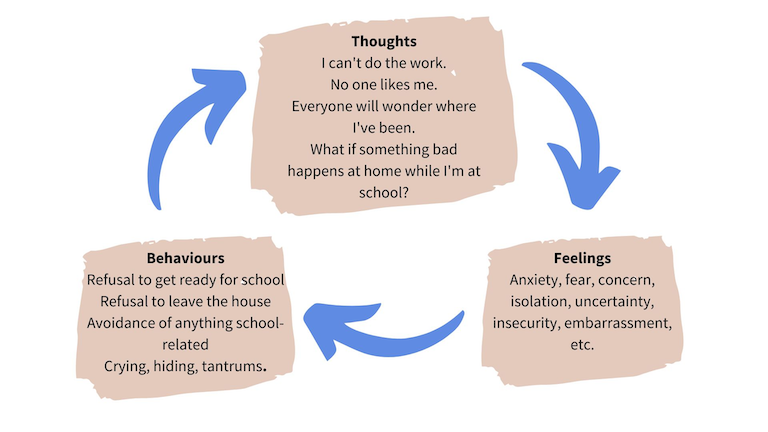Explore insights, updates and real-world impact from across the Studybugs community. From school absence trends to public health innovation, our blog shares stories and ideas that help keep children happy, healthy and in school.
Emotionally Based School Avoidance: What Can You Do to Help?

Sometimes still referred to as school refusal, Emotionally Based School Avoidance (EBSA) is a significant problem that affects many children, families and schools. According to a 2015 study1, approximately 1-2% of the school population are absent due to emotional reasons.
In cases of EBSA, children find the idea of attending school distressing. It could be something social or peer-related, difficulties with the curriculum, a problem with the physical environment, or something external.
This can lead to long absences and therefore a detrimental effect on attainment, social development and mental health, so it’s critical to act early and sensitively to address EBSA.
So, what can you do as a school?
Recognise the Signs Early
EBSA can be difficult to identify because some of the presenting behaviours are similar to other attendance issues, such as truancy. But EBSA differs because of the emotional root of those behaviours, so attempting interventions that don’t address the underlying emotion are likely to be ineffective at best and potentially even deepen anxiety.
Indicators of EBSA include:
- A change in punctuality or attendance
- Frequent complaints of illness before or during school
- Regular absences without indication of anti-social behaviour
- Reduced engagement in school activities
- Social isolation
- Lack of confidence
- Negative conversations about school
- A change in behaviour
- A pattern of absences following weekends and holidays
Recognising EBSA is yet another reason why it’s critical for schools to have robust systems in place for monitoring pupil attendance. You need to make sure you’re able to spot patterns, notify the right staff at the right time, and take appropriate action to address issues early. That’s what Studybugs Attendance is all about.
It’s also important to place a strong emphasis on supporting pupils’ mental health. For this, you might be interested in Studybugs Wellbeing, an early-warning system that notifies you when a pupil is reported absent for a mental health-related reason, such as anxiety, crying or fatigue.
Take Prompt Action
It’s critical to act early if you notice signs of EBSA. The longer it goes on, the more entrenched the difficulties and behaviours become, making it harder to reach a positive outcome.

Once you’re satisfied that EBSA is the cause of absence, you can put together a plan to address it.
Work With the Pupil and Their Caregivers
When you’ve identified behaviours that indicate EBSA, it’s time to speak to the pupil and their parents or guardians to put together a plan to support them. It’s really important that any parents or guardians are supported in their role, as a number of the coping strategies will be influenced by their relationship; for example, secure attachment, awareness of anxiety and factors that trigger it, actively listening and encouraging their child to share.
Parents may also need their own support. They might find it hard to talk about the difficulties they have getting their child to school. Or the EBSA might be triggered by something home-related, which they may find difficult to talk about, like a divorce or separation. As a school, you can help by keeping regular contact with parents and agreeing how and when you’ll keep in touch.
You can also share resources with parents to help them develop their understanding of EBSA and their role in addressing it, either as a preventative measure or when EBSA is identified.
When you come to putting together a plan, make sure it’s agreed with the parents or guardians, the pupil, and that any staff who come into contact with the pupil are aware.
Involve the Child in Their Return to School Approach
Not Fine in School2 champion a child-led support plan to encourage children back to school.
Any approach will need to be tailored to the individual, but might include elements such as a temporarily reduced timetable, remote learning, or an alternative space for the child to work in. Working with the child and their parents or guardians will help you come up with a plan that best suits the child’s needs.
The plan for returning to school should be realistic and flexible. You should also be prepared for difficulties in implementing it and consider where there may be sticking points and what you can do to solve them. You may also consider engaging outside agencies if the problem is particularly engrained or you need additional support.
If there are setbacks, then simply work towards returning to the plan when possible. Each day is a new day. The important thing is to be consistent with what you want to achieve and to be united with the parents; any concerns should be discussed separately and not shared with the child.
Regularly Review Your Plan
Keep on top of how your plan is working, make a note of progress and any setbacks so you know if you need to make any changes. Reviewing should also involve the child and their parents. It’s a good opportunity for you all to celebrate successes and talk through things you’re finding difficult.
Hopefully, the review process will be positive for everyone as you see concrete progress being made!
The Relationship between EBSA and SEND
Not Fine in School2 reference the often overlooked correlation between SEND and anxiety, citing various sources. Autism Spectrum Disorders and Sensory Processing Disorders in particular can lead to anxiety at school, which can in turn lead to EBSA.
It’s important to consider how anxiety might also need addressing alongside SEN in any support plans or EHCPs, particularly if there are ongoing issues with attendance, which could indicate that the child’s needs are not being met.
About This Guide
This guide has been put together by Studybugs to help schools get to grips with the basics of EBSA. We’ve used a number of resources to compile this post; for guidance that digs furthers into the specifics, including sample return to school plans, please see the resources below.
Studybugs enables a whole-school approach to pastoral care. Tools like Studybugs Attendance and Studybugs Wellbeing make it easy to monitor pupil attendance and children’s health and wellbeing, create an action plan, maximise pupil attendance, and ultimately keep children happy, healthy and in school.
Resources:
1Coping with life by coping with school: School refusal in young people, from Educational Psychology, edited by Tony Cline, Anthea Gulliford and Susan Birch.
Waterford: School Refusal Good Practice Guide for Schools
Hampshire Services: Emotionally Based School Avoidance
Roscommon School Refusal Resource Pack
— Lucas Abbott